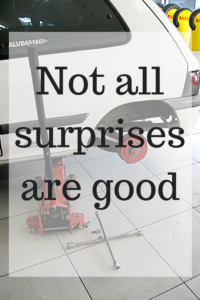The Frugal Mindset
Do you like surprises? Good ones, I do. If they’re bad, I’d rather avoid them. I’m fairly sure just about everyone feels that way. You know what’s interesting about it is that not everyone perceives good and bad the same way: What is good to you may not necessarily seem so good to me. The
The difference between good and bad is subjective
Not long ago, a young relative of mine told me that at the beginning of the year, she’d set a goal to have a certain amount of money saved by the end of October. She was very happy because she’d met that goal. Now, I didn’t feel like that amount she’d saved necessarily warranted the amount of glee she expressed…but it had been a challenge for her, and I do understand challenges…When we meet them, we deserve to be happy.
On the other hand, a few months ago, I was explaining to a friend how I’d been on my way home from work one morning and realized I would have to make a stop before getting there to have the brakes on my car replaced. His sticking point was that I considered it only an inconvenience—not bad news. He couldn’t believe that I didn’t feel the sudden and (somewhat) unexpected need to spend that much money was catastrophic. Honestly, it wasn’t bad news to me because I already had money designated for car repairs in savings. Having the money is part of my plan to avoid bad news. (I’ll share some more about this repair shortly.)
Where am I going with this?
Nobody enjoys bad news. No one wakes up in the morning saying, “I sure hope something goes wrong today.” What most people don’t realize is that we have the ability to circumvent a lot of bad news. We can make decisions and take action that determines whether an event will be a backbreaker or merely an inconvenience. We determine this by how well we prepare ahead of time.
That’s where the frugal mindset comes in.
Of course, we can’t anticipate everything, but a little planning—and adhering to the plan—can mitigate the consequences of many likely events. When we plan and take control, we are being frugal. We must plan for our future, our children, our retirement, and everything in between.
The concept of planning and taking action to minimize the effect—especially financially—of any unpleasant event on your lifestyle is important to the frugal mindset. Using common sense, I know my car will need periodic maintenance and occasional repair. It’s quite possible I won’t even be able to guess what will need to be repaired when, or how much it will cost, but I save money against the probability that something will break, and I’m ready when the repair is needed. I handle general maintenance the same way. I save ahead of time to have the cash on hand when needed. (Let me add a note here: If you research the make, model, and year of your car, you can often find a lot of information about the durability, life, and repair cost for many of its parts and systems. That can give you a huge “heads up” about what you’re facing and when.)
Ok, I said I’d get back to the story about fixing the breaks on my car…One day on my way home from work, I applied my breaks to make a stop. They made a loud rubbing sound and pulled to the right. I immediately knew the problem and that it was urgent enough that I couldn’t put off fixing them. I also knew it’d be a pricey repair. The important thing is that I had been regularly saving to fund car repairs for years, so I had the money I needed. Of course, this wasn’t the first time I’d had to use those funds. The key to having the repair covered is the practice of saving “regularly.” I don’t take a break. When I use designated money for a repair, I start repaying it from my next paycheck. That day I put the cost of repairing the breaks on a rewards credit card, and I paid off the card that evening. The story ends with me depositing my usual allotment to my car repair fund from my next paycheck.
As for my friend’s concern—it was about the cost. I know he has no savings, so what was a “that life” incident to me would have been a major setback if it had happened to him. Even the thought of it happening was stressful to him. The point is, I was ready—prepared—for it.
Frugal Mind = Confidence
When you’re prepared, you’re confident. Back in my school days, there were times I didn’t study for a test. Those times, on the day of the test, I was not confident. In fact, I was usually discouraged. How I had wished I had prepared. The same holds true in our financial lives. If you haven’t prepared a financial safety net, you’ll wish you had chosen to do so when problems come along.
I’ll admit that my plan evolved over time: When I started saving for “things,” unexpected or inevitable, I started with the biggest item I owned (my car) and saved money to buy a new car. As time passed, I changed my plan from saving money to buy a new car to saving money to buy a used car and cover repairs and scheduled maintenance. Now repairs and maintenance are factored into my budget. I don’t have to worry about needing the funds to repair or replace my car (or many other things). I have it covered, and I’m confident.
Frugal mind = frugal mindset = lifestyle
Being frugal is a lifestyle. It’s based on planning. As they adapt to a frugal lifestyle, many find they have to change from one based on whim and instant gratification. The nice part is you don’t have to do it all today. You can ease into it.
I used my car as an example earlier. I started out saving for a brand-new car. Eventually, I realized a good used one would serve me just as well and allow me to redirect some of the money I was saving for a car to other matters of concern. The day I did that, I became more frugal than I was the day before. And you would be correct to assume that my savings plan has undergone several transformations over the years, as I have learned to be more frugal. After I had what I felt was a sufficient amount saved for maintenance and car repair, I found another area I should be saving for, and I started saving for that. I continue to save for replacement.
Just to let you in on the little secret, I save a certain amount of money from every paycheck. If you would like to see the plan I use, read my article to protect everything. Please understand it has evolved into this. It didn’t just happen one day.
Planning
I save a certain amount of money out of every paycheck. If you would like to see the plan I use, read my article protect everything. Please understand it has evolved into this. It didn’t just happen one day. Planning may seem overwhelming initially, but it doesn’t need to be. Make deliberate, small changes, and you’ll soon find you have given purpose to your money. You’ll have a frugal mindset and be living a frugal lifestyle.
Conclusion
The frugal mind is a lifestyle based on financial planning and directed saving. Living a frugal lifestyle can considerably reduce uncertainty and stress.


